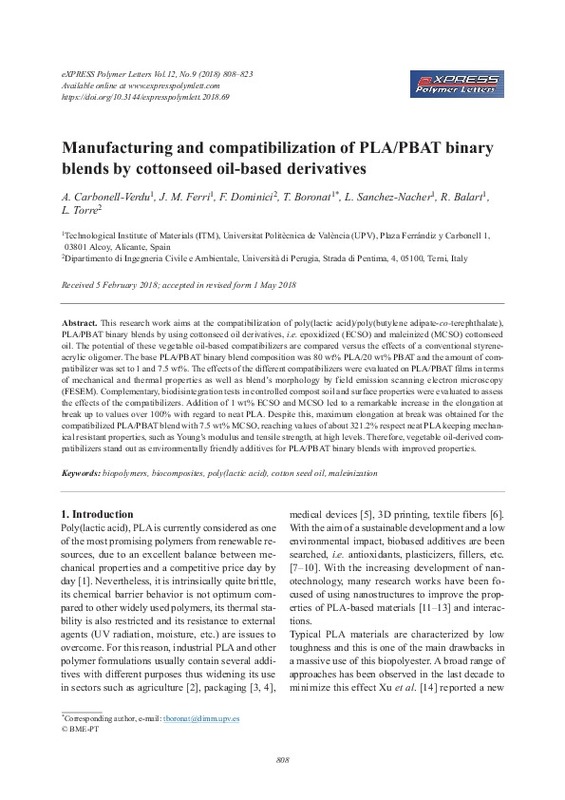JavaScript is disabled for your browser. Some features of this site may not work without it.
Buscar en RiuNet
Listar
Mi cuenta
Estadísticas
Ayuda RiuNet
Admin. UPV
Manufacturing and compatibilization of PLA/PBAT binary blends by cottonseed oil-based derivatives
Mostrar el registro completo del ítem
Carbonell-Verdu, A.; Ferri, J.; Dominici, F.; Boronat, T.; Sanchez-Nacher, L.; Balart, R.; Torre, L. (2018). Manufacturing and compatibilization of PLA/PBAT binary blends by cottonseed oil-based derivatives. eXPRESS Polymer Letters. 12(9):808-823. https://doi.org/10.3144/expresspolymlett.2018.69
Por favor, use este identificador para citar o enlazar este ítem: http://hdl.handle.net/10251/147543
Ficheros en el ítem
Metadatos del ítem
| Título: | Manufacturing and compatibilization of PLA/PBAT binary blends by cottonseed oil-based derivatives | |
| Autor: | Carbonell-Verdu, A. Dominici, F. Torre, L. | |
| Entidad UPV: |
|
|
| Fecha difusión: |
|
|
| Resumen: |
[EN] This research work aims at the compatibilization of poly(lactic acid)/poly(butylene adipate-co-terephthalate), PLA/PBAT binary blends by using cottonseed oil derivatives, i.e. epoxidized (ECSO) and maleinized (MCSO) ...[+]
|
|
| Palabras clave: |
|
|
| Derechos de uso: | Reserva de todos los derechos | |
| Fuente: |
|
|
| DOI: |
|
|
| Editorial: |
|
|
| Versión del editor: | https://doi.org/10.3144/expresspolymlett.2018.69 | |
| Código del Proyecto: |
|
|
| Agradecimientos: |
This work was supported by the Ministry of Economy and Competitiveness (MINECO) (grant number MAT2017-84909-C2-2-R). A. Carbonell-Verdu wants to thank Universitat Politecnica de Valencia for financial support through an FPI grant.[+]
|
|
| Tipo: |
|









